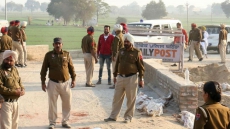In a suspected case of honour killing, a 20-year old Jat Sikh man and his lover, also a Jat Sikh were murdered by the latter’s family in Khemkaran village, close to the India-Pakistan border in Punjab’s Tarn Taran district.
The two were identified as Husanpreet Singh and Ramandeep Kaur, and both were in their early twenties. Singh’s naked corpse was found in a gutter in the woman’s uncle’s home, while her body was discovered bundled in a tarpaulin inside the house.
The bodies are in the custody of the police, and have been sent for postmortem examination. The accused comprise the woman’s father, Jassa Singh, his three brothers, Sher Singh, Harpal Singh and Bohar Singh, his son Aakash, his wife Manjit Kaur, Sher Singh’s son Rana, Harpal Singh’s wife Manpreet Kaur and Bohar Singh’s son Ghulla.
The man’s house is merely 60 meters from the accused’s.
According to the police, the young couple developed a relation a month ago.
As per information, Husanpreet had gone to Ramandeep’s house around midnight.
However, at around 3.30 am, the family members woke up and got enraged.
They attacked both the victims and killed them on the spot. Later, they disposed off the body of Husanpreet in a sewerage pipe.
When Husanpreet did not return home, his family started looking for him.
When they went to Ramandeep's house, her family did not allow them to enter. They got suspicious and informed the police.
When the police reached the spot, they found the body of Ramandeep lying on the courtyard. They enquired about the where bouts of Husnpreet. Initially, they did not disclose anything, but when the police asked sternly, they told that they had disposed the body in a sewerage chamber.
The police recovered the body and took the family members into the custody
In March, the Supreme Court came down hard on the practice of honour killings (where families murder their sons/daughters who are in a relationship with people from other castes or religions, or, in some cases, the same clan) and on the local juries (also called khap panchayats) delivering such judgements. The practice is especially prevalent in rural areas of Punjab.



